Orthodox / Catholic Book Club
Resumes September 9, 2025
7:00-9:00 pm
Spirituality An Art of Living: A Monk’s Alphabet of Spiritual Practices
by Benoit Standaert, OSB
Spirituality: An Art of Living was born out of a generous impulse: to pass on lessons from the monastic tradition to lay people so as to help them achieve a more ardent and fulfilling spiritual life. In this book, Benedictine monk, teacher, and scholar Benoît Standaert provides ninety-nine entries covering topics like abba, humility, listening and time. The entries are divided in twenty-six chapters according to the letters of the alphabet. A perfect book for all spiritual seekers to sit with and enjoy again and again.
Available for purchase online from Amazon HERE.
DIALOGUE AMONG CHRISTIANS:
The Orthodox / Catholic Book Club
St. Paul’s Greek Orthodox Church + St. John Neumann Roman Catholic Church
+ St. Paul’s Coptic Orthodox Church
Beginning at the turn of the third Christian millennium in September, 2000, twenty-five parishioners from St. Paul’s Greek Orthodox Church and St. John Neumann Roman Catholic Church in Irvine, CA have gathered together once each month for a Christian book club that provides an opportunity to pray and study together, to explore our common roots in the first thousand years of Christian history, and engage in ecumenical dialogue at a grassroots level.
 Originally led by Mr. Eugene O’ Toole (1928-2021), who at the time was the director of adult educational ministries from St. John Neumann’s, and Father Steven Tsichlis, the pastor of St. Paul’s, these meetings have been a structured attempt to explore a common path for Roman Catholic and Orthodox Christians in living more prayerful, Christ-centered and Spirit-filled lives. Each meeting begins with a half hour of prayer, as Roman Catholic and Orthodox Christians pray the Psalms and read the Scriptures together while remembering the saints of the first millennium that are shared by both communities. Over the years, the group has included people from many different backgrounds: lay leaders from both traditions; former Roman Catholic religious; converts to Orthodoxy from evangelicalism and Pentecostalism; Catholic parochial school teachers; college professors; both Latin and Eastern Rite Catholics; and seekers exploring the wisdom of the ancient Christian faith.
Originally led by Mr. Eugene O’ Toole (1928-2021), who at the time was the director of adult educational ministries from St. John Neumann’s, and Father Steven Tsichlis, the pastor of St. Paul’s, these meetings have been a structured attempt to explore a common path for Roman Catholic and Orthodox Christians in living more prayerful, Christ-centered and Spirit-filled lives. Each meeting begins with a half hour of prayer, as Roman Catholic and Orthodox Christians pray the Psalms and read the Scriptures together while remembering the saints of the first millennium that are shared by both communities. Over the years, the group has included people from many different backgrounds: lay leaders from both traditions; former Roman Catholic religious; converts to Orthodoxy from evangelicalism and Pentecostalism; Catholic parochial school teachers; college professors; both Latin and Eastern Rite Catholics; and seekers exploring the wisdom of the ancient Christian faith.
“Roman Catholic and Orthodox Christians have spoken to each other more in the past 50 years, since Vatican II, than in the previous 500,” Mr. O’ Toole commented. “With the symbolic gesture of lifting the mutual excommunications of 1054 by Pope Paul VI and Patriarch Athenagoras on December 7, 1965, a new era of dialogue began that has been carried forward by Pope John Paul II and Patriarch Demetrios, as well as by Patriarch Bartholomew and Pope Benedict XVI.”
Over the past two decades more than 120 books have been read by participants in this ecumenical fellowship. Among them have been modern Roman Catholic writers on the spiritual life like Thomas Merton, Henri Nouwen, Thomas Keating, Basil Pennington, Paula Huston, Ruth Burrows and James Martin, SJ; and contemporary Orthodox writers like Metropolitan Anthony Bloom, Metropolitan Kallistos Ware, Thomas Hopko, Olivier Clement, Jim Forest and Kyriakos Markides and more recently, Matthew the Poor.
“We have read books by Pope John Paul II and Pope Benedict XVI as well as by Ecumenical Patriarch Bartholomew. We have read about St. Maria Skobtsova of Paris and St. Silouan of Mount Athos; St. Edith Stein and Mother Teresa of Calcutta. We have read The Imitation of Christ by Thomas a’ Kempis and The Life of St. Francis by St. Bonaventure; the anonymously written Way of a Pilgrim and The Life of St. Anthony the Great by St. Athanasios of Alexandria. We’ve read St. Augustine of Hippo and St. John Chrysostom,” said Father Tsichlis.
In 2012 the fellowship expanded to include the local Coptic Orthodox community. Through Father Tsichlis’ contact and growing friendship with Father Kyrillos Ibrahim, members of St. Paul’s American Coptic Orthodox Church in nearby Tustin joined the book club, bringing the riches of the ancient Coptic monastic tradition of the Desert Fathers and Mothers to our discussions of the Christian spiritual life. Reading books such as The Communion of Love and Orthodox Prayer Life by Matthew the Poor, a contemporary Coptic monk and spiritual father, have had a profound impact on everyone participating in the book club.
Duncan Simcoe, a member of St. Paul’s and a professor at California Baptist University in Riverside, CA, added: “It’s very humbling to be able to able to benefit from such a strong and vibrant river of collective wisdom and insight. Having read these books I now feel that I have so many friends who have reached across history and eternity to offer me the most profound kinds of aid in my journey as an Orthodox Christian. This kind of dialogue with our Catholic and Coptic brothers and sisters is very important for moving beyond an ‘us vs. them’ way of thinking.”
This has borne fruit in a number of ways: first, the parishes began doing ministry and outreach together. The people of St. Paul’s Greek Orthodox Church have gotten involved in the work of Isaiah House, a Catholic Worker house providing shelter for the homeless in Santa Ana; hosted a luncheon to provide scholarships to Catholic elementary schools for impoverished children; and raised funds for the work of Father Greg Boyle and Homeboy Industries in Los Angeles. The people of St. John Neumann have helped raise funds for the building of an Orthodox Church in the Tanzanian village of Kobunshwi and hostecd a luncheon for St. Innocent’s Orphanage, an Orthodox ministry for homeless boys outside Tijuana, Mexico.
Second, participants have come to recognize the common roots that both traditions have in the first millennium. Jim Cordes, who is a longtime participant in the program and a member of St. John Neumann, said, “I didn’t realize how similar we are in our practice of Christianity. I’ve come to realize that in so many ways we are more similar to one another than we are different.” And Dorothea Love, a member of St. Paul’s Greek Orthodox Church, added “I’ve had a deep respect for the Roman Catholic faith all my life and as a result of this class my respect and love have only increased. Many of us have been together now for ten years, since the beginning of our study, and we share the love of Christ as brothers and sisters, truly respecting and caring for one another. “
“A quote from one of our recent books comes to mind,” Mr. Simcoe recalled: “An elder said: I have fought for twenty years to see all human beings as only one.”
Third, in looking more deeply at one another’s histories, Roman Catholics have learned of the many challenges that Orthodox Christians have faced — and still face — practicing their faith in Muslim countries, particularly in Egypt, Turkey and other Middle Eastern Countires; and the terrible persecution of the Church during most of the 20th century under Communism in countries like Russia and Romania. Orthodox Christians have learned more about the history of Roman Catholicism and the effects of the 16th century Protestant Reformation on Roman Catholic life, history and thought, as well as the history of western Europe and America.
“We’ve all been enriched by our time together,” Doris Wintrode, a member of St. John Neumann and a retired Catholic high school teacher, remarked, “These years of dialogue have been a true gift.”
In addition, the books that have been read have “given me a heightened awareness of how shallow my prayer life was and that I needed to make my relationship with Christ a deeper one,” said Ms. Love. “It’s changed the way I pray, and I now spend greater time in study and reading of the Scriptures.”
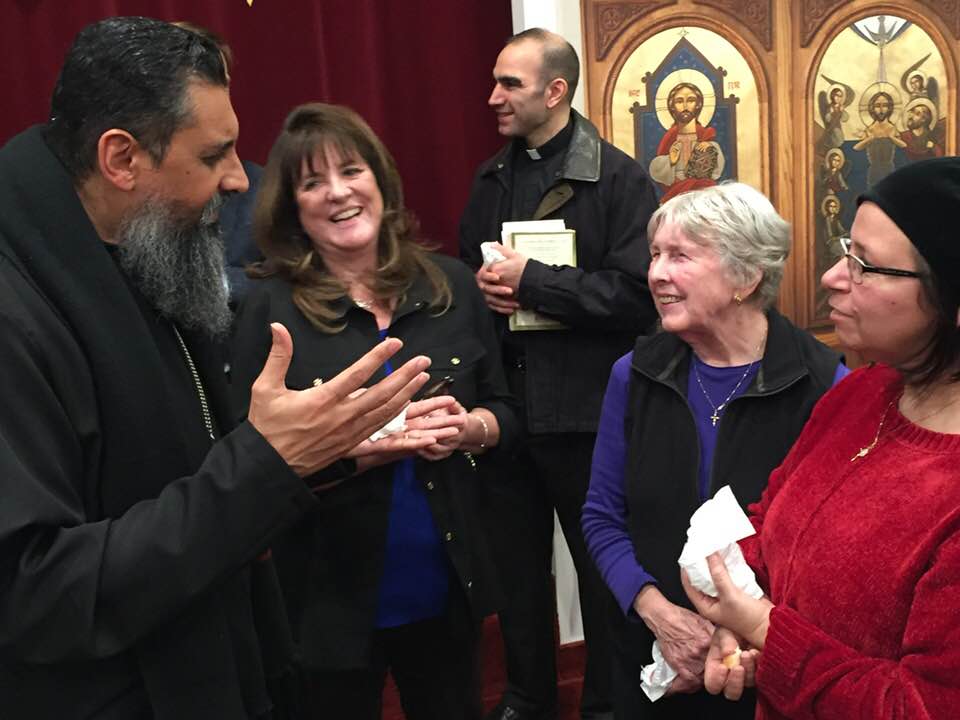
Father Kyrillos Ibrahim talking with book club participants
Father Ibrahim summed it up this way: “We give thanks and glory to our Lord Jesus Christ, who gathers His children from the East to the West and from the North to the South to sit and feast on the words of eternal Life, and we ask and entreat Him for the day when we will gather together around one Eucharistic Table, as one Body, to partake together of His holy Body and precious Blood.”
Fr. Thomas Merton
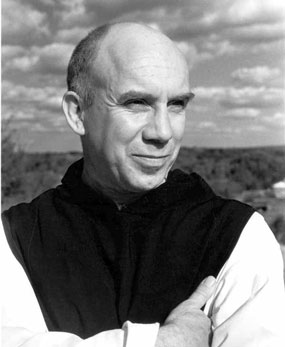
– Father Thomas Merton (1915-1968)
Fr. Lev Gillet
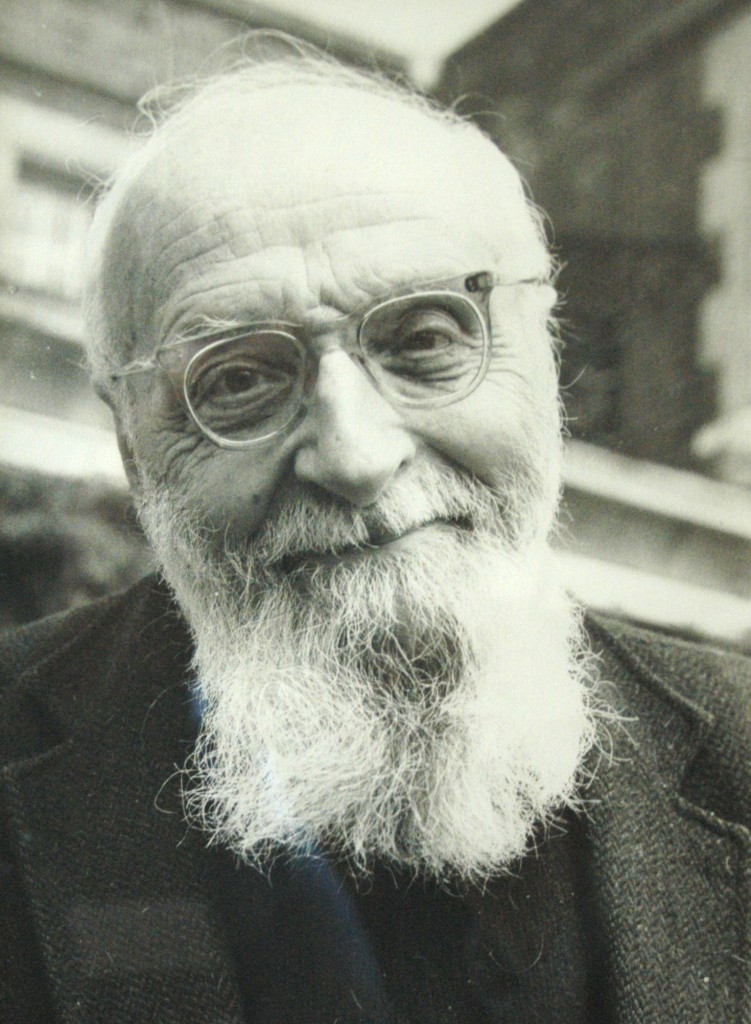
– Father Lev Gillet (1893-1980) who wrote under the pseudonym “A Monk of the Eastern Church”
St. Pope John Paul II
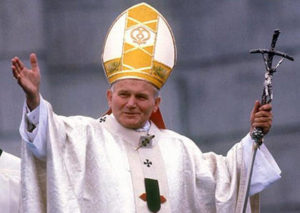 It is legitimate to affirm that the gap between the Catholic and Orthodox Church is not very wide. We have almost everything in common. It seems to me, in fact, that the question we must ask ourselves is not so much whether we can re-establish full communion, but rather whether we still have the right to remain separated. The sin of our separation is very serious. May the Lord open our hearts, convert our minds and inspire in us concrete, courageous steps, capable if necessary of breaking through clichés, easy resignation or stalemate. The deepest nature of the Church demands it.
It is legitimate to affirm that the gap between the Catholic and Orthodox Church is not very wide. We have almost everything in common. It seems to me, in fact, that the question we must ask ourselves is not so much whether we can re-establish full communion, but rather whether we still have the right to remain separated. The sin of our separation is very serious. May the Lord open our hearts, convert our minds and inspire in us concrete, courageous steps, capable if necessary of breaking through clichés, easy resignation or stalemate. The deepest nature of the Church demands it.
– St. Pope John Paul II (1920-2005)
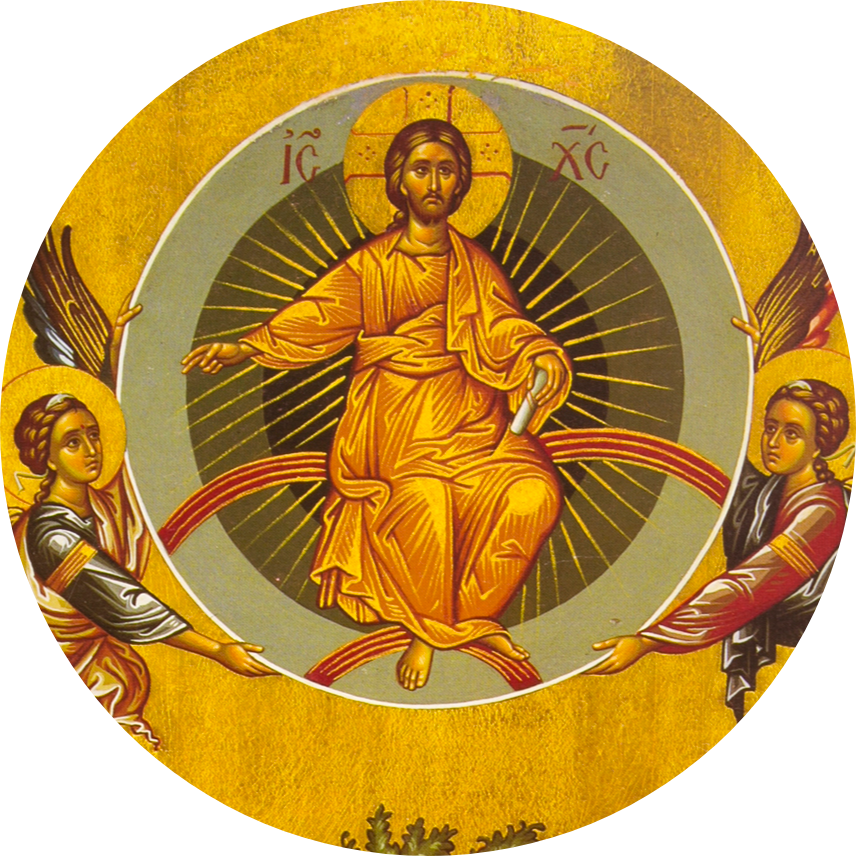
Book Club Reading Lists
Author Articles
Discussion Questions



